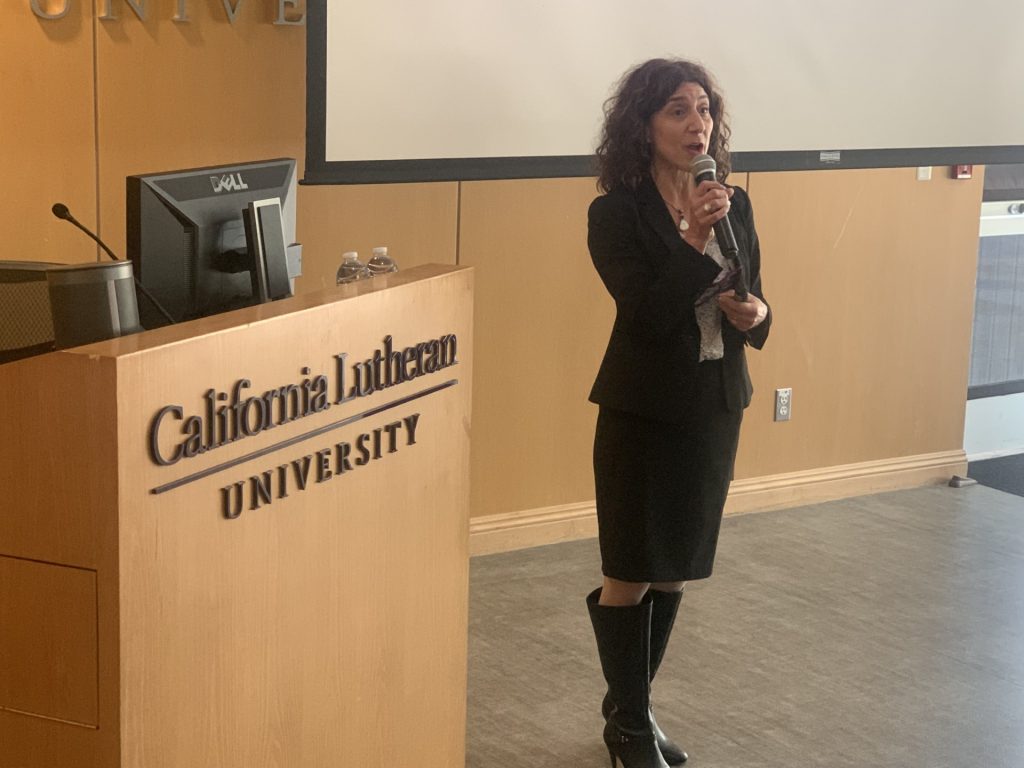CLU president alludes to no-confidence vote in state of school speech
IN THIS ARTICLE
- Central Coast Topic
- Mike Harris Author
By Mike Harris Wednesday, February 7th, 2024

California Lutheran University President Lori Varlotta on Feb. 6 gave her first public address since a faculty no-confidence resolution in her last month.
While she didn’t mention the resolution by name in her State of the University speech at the Thousand Oaks-based school, Varlotta alluded to it, citing factors she believes fueled it.
“There’s never been a harder time to be a college president,” Varlotta said, due in part to a growing number of Americans questioning the value of a higher education degree.
She also noted that like many other universities, enrollment at CLU began slipping in the wake of the Covid-19 pandemic, cutting into tuition revenues.
Moreover, adaptive changes, like the ones she was hired in 2020 to implement at the school, “disrupt the status quo,” according to a PowerPoint she used in her presentation.
“Many of us who know that we need to make adaptive changes are going to hit some bumpy roads,” Varlotta said in a meeting with reporters from the Business Times and other publications following her address.
The CLU faculty passed the no-confidence resolution on a 122-3 vote on Jan. 16, petitioning Varlotta to resign or for the school’s Board of Regents to remove her.
The resolution said in part that the faculty has no confidence in Varlotta’s “ability to be an effective steward of the university budget and her ability to maintain the financial health of the institution.”
The day after, three officers of the Board of Regents, speaking on behalf of the full body, issued a statement saying Varlotta continues to have the regents’ “full support.”
On Jan. 20, Varlotta, CLU’s first female president, told the Business Times she doesn’t intend to step down.
Varlotta declined to discuss the no-confidence resolution in the meeting with reporters.
She said she only wanted to answer questions “about the exciting things and what’s next for Cal Lutheran.
“I’ve already given interviews on the resolution,” she said. “But I believe I addressed it pretty clearly” in her speech.
Varlotta said she did so “by talking about the changes that are afoot at the local and national level … and stating very clearly that we are a campus where there is a sense of change afoot that is anxiety-producing for many people.
“Change is difficult,” she added.
The faculty resolution said educators also have no confidence in Varlotta’s ability to “refrain from alienating many longstanding donors and supporters of Cal Lutheran.”
In September 2023, 17 major donors to the Elton and Janice Gallegly Center for Public Service and Civic Engagement on the university’s campus demanded reimbursement for donations made toward its development.
Elton Gallegly, a Republican Congressman from Simi Valley from 1987 to 2013, has sued the university, Varlotta and former school president Chris Kimball for breach-of-contract, alleging the school had failed to fully establish the center.
Varlotta’s State of the University address focused in part on the adaptive changes made at the school in the past decade and the additive and adaptive changes on the horizon.
Adaptive changes made at CLU in the past ten years include merging with Pacific Lutheran Theological Seminary in 2014, diversifying faculty, staff, and students, and expanding the school’s curriculum to include more than 45 majors.
Future changes that must be implemented include reviewing all major fields of study to ensure that the school offers the ones that students want and the marketplace needs and focusing more heavily on adult students, according to the PowerPoint.
Despite the anxieties that “are alive and well on our campus,” Varlotta said that as president, “I must be sure that I do the best I can to keep us going and making the adaptive changes that first and foremost keep students first.”
Varlotta told reporters that the school’s financial future looks bright despite a current operation shortfall in which expenses exceed ongoing revenues.
“We believe that’s a short-term phenomenon … that we can make better by growing our net tuition revenues,” she said.
“Deficits are not a part of our normal,” Varlotta said. “They’re not unusual for many, many tuition-driven institutions. But we’ve always enjoyed balanced budgets.”
email: mharris@pacbiztimes.com









